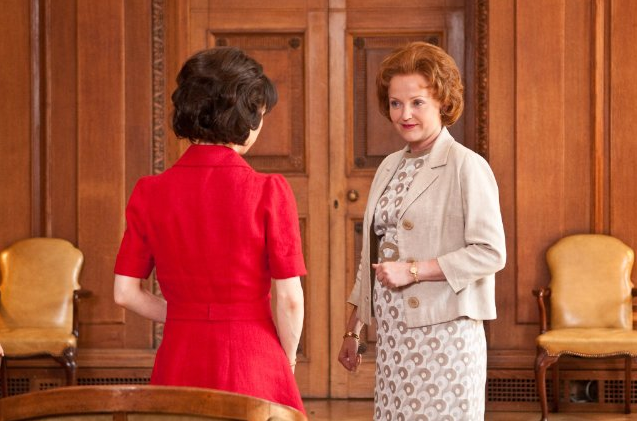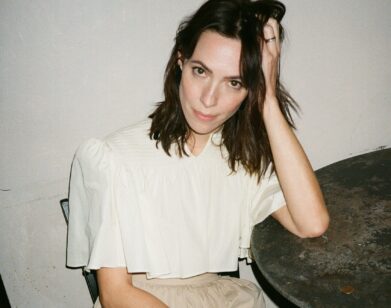Miranda Richardson, Queen of the Castle

MIRANDA RICHARDSON IN MADE IN DAGENHAM. FILM STILL COURTESY OF SONY PICTURES CLASSICS
Miranda Richardson’s been on top of the acting heap since her Oscar nominations in the early 1990s, for Damage and Tom and Viv. Since then, she’s worked for directors as diverse as Stephen Daldry (The Hours), David Cronenberg (Spider), and Richard Kelly (Southland Tales). This fall, she’s taking a step towards realism with Nigel Cole’s Made in Dagenham, about a real-life 1968 union struggle at a women’s auto-manufacturing plant in England. Richardson’s performance, as the canny and comic British Secretary of State Barbara Castle, may bring her to the Oscars once more. We caught up with Richardson to talk about the film, how Castle compares to Thatcher, and—of course!—falconry.
DANIEL D’ADDARIO: Made in Dagenham tells a story from English history that many moviegoers Stateside probably don’t know—
MIRANDA RICHARDSON: It sounds like centuries ago when you say that!
D’ADDARIO: Well, it’s not like Henry VIII or anything.
RICHARDSON: No! No, it isn’t. But it sounds like that. And the attitudes, honestly, might as well be. We can kind of laugh at it now—the ways the women are patronized, the way they’re talked to and about… it’s very odd it was such a short time ago.
D’ADDARIO: Do you think there are parallels between the way the women in the film are treated and today?
RICHARDSON: We’re still fighting over the same issue—equal pay. On any given day, there’s some guy with a very interesting idea of what womanhood is about, what womankind is about, and how they should behave. I guess they just need to be enlightened.
D’ADDARIO: I’m always interested in how actors prepare to play historical characters—did you go back and watch Baroness Castle on tape?
RICHARDSON: Yeah! I found some footage of her. I didn’t have so long to prepare, so I said, “Give me what you’ve got,” and I read her biography, looked at pictures, which are great, because you kind of soak them up in a different way than watching actual footage. And I worked with a dialect coach, the wonderful Penny Dyer, who is quite well-known for massaging people into real-life characters. She worked on The Queen, and she worked with Michael Sheen a lot, who is the king of the real-life character.
So, that was all good, and then we get to the costume session. I find the costume session good, hard work, because you’re making choices—shedding all the time, going, Yes, not that. That looks right, that would look right on me, for her.
D’ADDARIO: And the way you played her, I was pleasantly surprised to find her very sympathetic. Did you find that in the historical record?
RICHARDSON: Oh yes! This is not Margaret Thatcher! This is a heroine—she’s fantastic, this woman! That’s why I wanted to play her, as well: she means so much to so many people. She’s still naturally compared to Margaret Thatcher—but, I mean, she’s humane! This woman is a collaborator, and a thinker, and a doer, is at the top of her game. She’s there for a reason.
D’ADDARIO: The Dagenham strike took place when you were a child—do you remember anything from that period?
RICHARDSON: No, my head was full of horses.
D’ADDARIO: Speaking of natural pursuits, I read that you like falconry. Is that true?
RICHARDSON: I love the birds of prey. I love all wildlife, and I got fascinated with falconry because I had a close encounter with a falcon—actually, a kestrel. I just sat with the bird all day; it was dazed, it had flown into some wire netting. I just sat with it—I didn’t know what to do, I didn’t want to take a wild thing to a vet, and I wasn’t even confident that I could pick it up. But by the end of the day—first it hopped onto the toe of my boot, then it flew onto my shoulder, and I felt so incredibly privileged, and I had the satisfaction of seeing this bird take off and find its mate, who was flying around a church tower nearby. I was completely hooked. And I discovered this arcane thing with falconry, and I went on courses with a childhood hero of mine, whose book I was constantly getting out of the library—not that anybody else was dying to take this book out, but I kept renewing it and renewing it.
D’ADDARIO: Do you find yourself missing the wildness of nature when you’re in the city, either filming or just doing whatever you do?
RICHARDSON: Yeah, I do… But also, it’s exciting to see how wildlife integrates into a city. There’s a lot of them around. My first day in the East Village, I went walking and I saw one above the streetlight. Most people don’t look up, in cities! Looking along, or down, or in shop windows—you’ve just got to look up. It’s all going on up there.
D’ADDARIO: On a completely different note, your co-star Sally Hawkins is so talented, and still kind of breaking out: did you have any advice for her on the set?
RICHARDSON: God, no! I wouldn’t dare! I wouldn’t dare! It wouldn’t occur to me—she doesn’t need advice, she’s on her course, she’s great. She’s a lovely girl. If she asked me something, I would give her a civil reply! [LAUGHS] And she’s very good, because she’d ask for more time, where I describe myself as a more smash-and-grab actress, you know, workmanlike. I’m afraid I’m going to be hated if I take too long over a scene.
D’ADDARIO: Do you find yourself ever wanting to improvise?
RICHARDSON: Oh, God, it’s kind of an affront to me, that word. If it happens organically, and you just can’t help yourself, fine. But if somebody says, “Oh, we’re going to improvise!,” I’m like, Oh, get me out of here.
D’ADDARIO: So you were trained to go exactly as written.
RICHARDSON: I like a script.
D’ADDARIO: You also play Rita Skeeter in the Harry Potter films. What’s the one question you’d ask yourself if you were a tabloid journalist?
RICHARDSON: Oh, jeez. I have no idea! You’re having fun, and I’m not. It’s so against my nature. It’s not to say I’m not curious, but I hate to pry.
D’ADDARIO: So is it a challenge for you to play that kind of character?
RICHARDSON: No! Because there are so many people who do like to pry! Our press is the most disgusting in the world.
D’ADDARIO: Do you get frustrated with the British press?
RICHARDSON: Well, actually, I’m so boring that they kind of leave me alone now. People will believe what they want to believe anyway.
MADE IN DAGENHAM IS OUT IN LIMITED RELEASE THIS FRIDAY, NOVEMBER 19.






